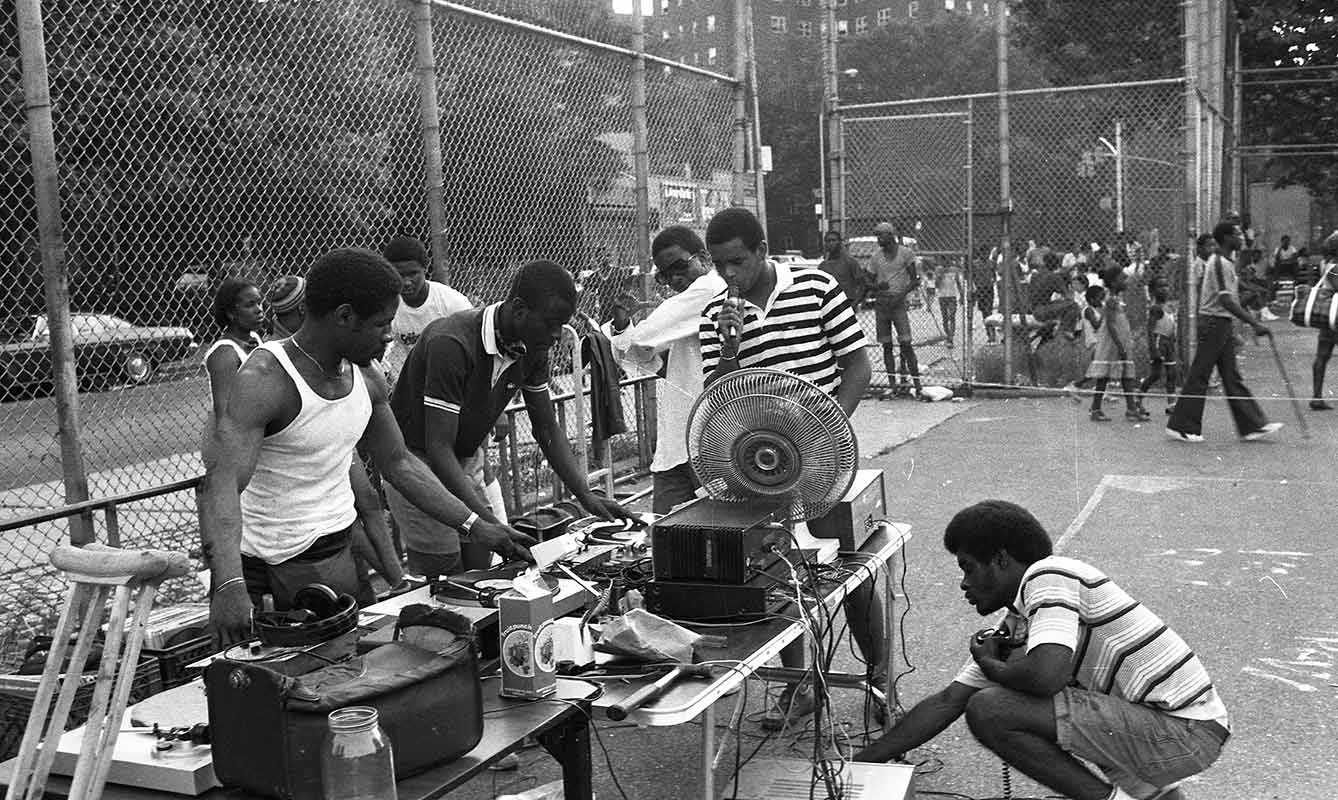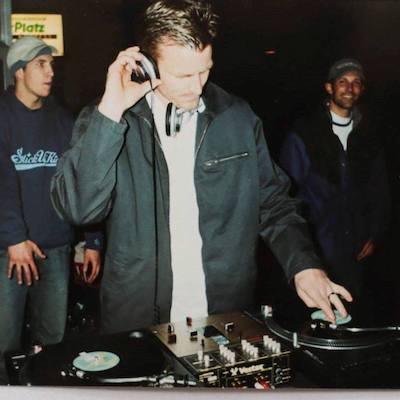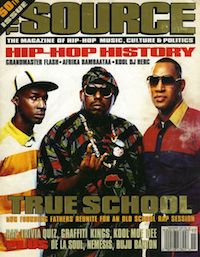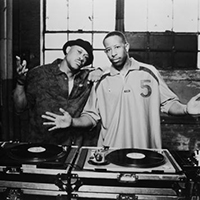
Music, songs and sounds that breakers break to.
History
The original breakers chose particular songs, or parts of songs, to break to—often a short percussive section of a record called the break. DJ Kool Herc recalled that some people at his parties would wait for the break to dance , which in turn led to his idea of playing breaks back to back. This technique was later refined by Grandmaster Flash. Herc used "black soul and white rock records with an uptempo, often Afro-Latinized backbeat" , according to Chang, who, citing Afrika Bambaataa's contributions, emphasized the diversity of the sources of music. At the same time, the influence of funk can be heard in the majority of breaks chosen by the early DJs.
DJs proceeded to augment the music with turntablism, MCing, and beatboxing, creating music later termed hip hop. Unlike extending the break, these other innovations were not done for the dancers, necessarily. Indeed, hip hop music evolved away from breaking in the late 1970s, concurrent with the dance's waning popularity.
Breaks
Breaks, or breakbeats, beats, b-beats, percussive, often instrumental, songs or parts of songs conducive to dancing. DJ Kool Herc's selection of music, and his decision to repeat particular parts of records, informed the original formulation of breaks (and hip hop music). Afrika Bambaataa observed that "Herc was the first to push it in the culture, but breakbeats had been around since disco, since James Brown, all the little breaks between records" .
Hip hop
Hip hop or hip hop music, a type of music with stylistic similarities or a historical connection to the music associated with hip hop culture. Herc, Flash, and Bambaataa discuss hip hop in 1993:
BAM: They're ignorant. They don't know the true forms of hip-hop. Just like I tell 'em, you got all styles of hip-hop, you gotta take hip-hop for what it is. You got your hard beats, you got your gangsta rap, you got your electro-funk sound which came from the party rock sound, you got your Miami bass, you got the go-go from DC. We was playin' go-go years ago. If you really with Teddy Riley, he came to Bronx River parties and heard go-go music and just flipped it up and now you got new jack swing. All of this was all part of hip-hop.
FLASH: It's all about different tastes. It could be hard drums like a Billy Squire record. It could be the bass hitting and drums soft like "Seven Minutes of Funk." It could have the hallway echo effect of "Apache."
HERC: We can't let the media define this for us. Someone says it's got hardcore beats and talkin' about bitches sucking dick, that's hardcore. That same person says that Jazzy Jeff & the Fresh Prince are soft, it's not hip-hop. It is hip-hop. It's just another form. It's about experimenting and being open.
BAM: Different generations have lost the true meaning. We were teaching the public when we did parties in the park.
MCing
Work in progress
Beatboxing
Beatboxing, a form of vocal percussion. It is sometimes called hip hop's "Fifth Element" .
Doug E Fresh claimed, "I'm the inventor. I am the originator" . Fresh developed beatboxing gradually, imitating songs (including hip hop tracks) he heard from the record store he passed on his way to and from school. He would later beatbox during performances while DJ Barry B changed records, and began to feature it more prominently at Barry's urging . Other influential beatboxers from the 1980s include Darren "Buffy" Robinson and Biz Markie .
While many traditions of vocal percussion exist, it is unclear which, if any, influenced the creation of beatboxing. For example, James Brown's vocals often functioned percussively, while earlier, jazz musicians sometimes imitated drums while scatting.2 TyTe and Defenicial explored several forms of vocal percussion as part of their "pre-history of beatboxing" .
The etymology of beatboxing extends into the mid-1970s, where the term "beatbox" initially referred to a drum machine. According to Flash, "the beatbox is a manually operated drumbox that I used to play while I was Djing. It was a machine made in England by Vox. It had a bass drum key, snare, hi hats and hand claps. I used to play this like a typewriter almost. The phrase beat box was coined by me, but it didn't reach the masses. Well it went to sleep and reemerged with people doing it with their mouths. So the human beatbox is these guys emulating something that I created [...] My neighbor was a drummer who used it to keep his fingers nimble. Whenever he couldn't set up his drums he used this. He lived in the projects – 149th & Jackson Ave. I begged him to sell it to me, he sold it to me for $125.00" .3 Hager's 1982 article in the Village Voice also mentioned Flash's "electronic percussion machine called 'the beat box'" . Flash explained his motivation, "the beat box was an attempt to come up with something other than the techniques I created on the turntables to please the crowd" . Park et al. have claimed that "beat box" was a colloquialism for drum machines in the 1970s and possibly earlier, though a drum machine incorporating the term appeared only with the "ELI CompuRhythm CR-7030 Beat Box" in 1979 .
Notes on Funk
Work in progress
Footnotes
- The preferred version was the 1970 live recording on the Sex Machine album, according to Chang .
- For example, this performance by Dizzy Gillespie's quintet in 1966 . The lyrics to his composition "Oop Bop Sh'Bam" also imitate drum sounds.
- Flash provided a similar account of the beatbox to radio station Hot 97 in 2016 (although he gives the number as $150) .



